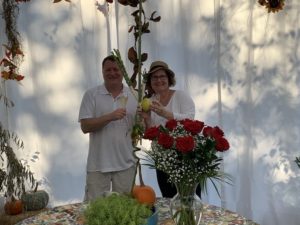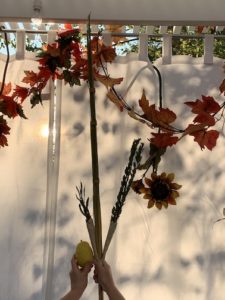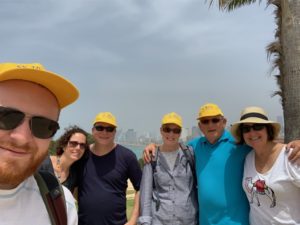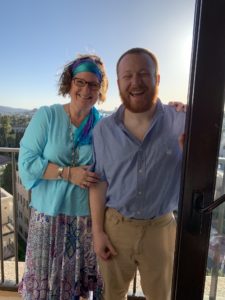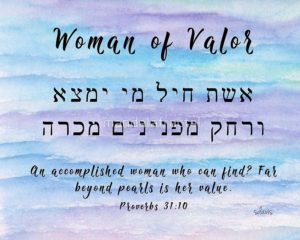Our Anniversary In The Sukkah
Twenty seven years ago, my husband and I stood under the huppa (chuppa) and made our vows to stick together through the best and worst of times and everything in between. We made a commitment to create a life together based on Jewish values under the watchful eye of God, that’s what a huppa is all about.
Today, on the last day of Sukkot, which is also Shabbat, known as Hoshana Rabbah, we are renewing our vows to each other and, by doing certain rituals under the sukkah, we are renewing our vows to God and the the Jewish people.
When I was a bride I clutched a bouquet of ivory roses as I walked down the aisle towards my soon-to-be husband who stood under the huppa waiting for me with a nervous smile on his face. Today, I hold in my hand the sweet smelling fruit called etrog (esrog) with the palm, myrtle and willow branches of the lulav, and wave the Four Species together in all directions in the sukkah. Scott’s still smiling, but this time because I’m shaking my lulav and we’re having strudel for dessert.
Lulav and Etrog Symbolize Unity
I have chosen Sukkot as the theme of this year’s anniversary–why not–considering the actual modern gift associated with the 27th year is “sculptures.” So, here’s my attempt to connect the meaning of the sanctity of marriage to this joyous holiday.
The lulav and etrog can be compared to a married couple, who bring their own unique qualities and strengths to a relationship. A lulav is a slender palm branch that is held together with two willow branches and three willow branches. An etrog, or citron, looks like an enlarged bumpy lemon and a whiff of the subtle scent is heavenly and intoxicating. Together, the branches and fruit have their own beauty and symbolism.
A midrash explains that the Four Species symbolize the importance of unity among different types of Jews. The etrog has both a flavor and a scent, like a Jew who is both learned and observant of the commandments. The lulav is from a date palm, and so it has a taste but no scent. It is likened to a Jew who is learned but does not apply that knowledge in action. A myrtle has a pleasant odor but no taste, and it represents the Jew who has little book learning behind his or her observance. Finally, the willow lacks both fragrance and taste, just like the Jew who neither studies the Torah nor keeps the commandments. These differences among Jews are substantial, yet we can still come together in solidarity, just as the lulav and etrog are bound together to merit a blessing. Same as a married couple. We bring our own unique qualities to the relationship, and we are better, stronger when we are committed as one.
Time to Rest and Recharge–It’s Shabbat
Our country, our world, is in turmoil. Protests, both peaceful and destructive, are on the rise right along with the surge of coronavirus. The days are stressful and confusing, and many people are sick and suffering. The good– people of all races, colors, religions, and generations are unifying and standing up for racial equality, social justice, and policy reform. The bad–government and police struggle to maintain control, while malicious radicals take advantage of the chaos. While people are coming together, there is still much division, anger, and emotion tearing us apart. We need law and order to live in a free society, but how we get there remains an elusive ethical dilemma one of the many themes of this week’s Parshat Behaalotcha.
We have a long way to go. but the conversation is started, and there is hope. And there is Shabbat.
In the famous words of Ahad Ha’am, founder of cultural Zionism:  “More than the Jewish People have kept Shabbat, Shabbat has kept the Jews.â€
Shabbat does not make any of the pain go away, but rather a brief period of time to rest and recharge so we can forge ahead in the next week with a renewed engergy and purpose. Shabbat has sustained the Jewish people since the beginning of time, allowing us to turn down the chaos and turn on our connection to God. When life around us seems so out of control, Shabbat is the one constant. The strike of a match that begins and ends Shabbat is the light that permeates the darkness and helps us see things clearer and with greater understanding.
And from Warren Goldstein, chief rabbi of the Orthodox Synagogues of South Africa and founder of the Shabbat Project, “Whatever Jews have gone through or are dealing with today, Shabbat is a reminder that for a 25-hour period, there is a need to disconnect from the world, reintegrate with family, be part of a community, and connect with God.â€
On Friday nights, my son usually comes over for dinner and stays overnight, and I make a special meal and of course challah. I even pour grape juice into a purple glass decanter for my husband (wine gives him a stomachache).  After the last bite of fudge brownie for dessert, my son and I sometimes venture into the living room, which I call the “Shabbat Parlor,†and we casually talk about the Torah portion while my toy poodle Beau snuggles contently on my lap. At some point in the night, Jack goes for a walk on his own to the common ground down the street. The moon hangs in the sky and there is a quietness in the air except maybe sounds of crickets and a croaking toad. This is where Jack comes to pray, joined only by a deer grazing nearby. I call it “davening in the corn field.â€
During Shabbat, Jack shares what he learned from the commentaries of some of his favorite Rabbi teachers, including Jonathan Sacks, David Wolpe and Rashi to name a few, while I usually rely on the summaries of Chana Weisberg’s Shabbat deLights or the many wonderful Zoom webinars from orthodox to reform, including Aish St. Louis and Congregation Shaare Emeth where I know the clergy personally. Sometimes we have our talks during our walks around the neighborhood, this is our uninterrupted time together, a safe place to share what’s on our minds. My husband and daughter prefer to do their own thing, and that’s OK, they are always welcome to join our deep conversations.
Even though currently we are not gathering in person in our communities because of coronavirus, there are many ways to stay connected, including Project Inspire, which allows Jews around the world to turn Friday night into Shabbat with inspirational speakers, musical performances, special guests, and even cooking demos to get us hungry for more.  I often tune into the one-hour program while I’m cutting up fruit or setting the table.
Shabbat has the most ancient roots in Judaism, but the universal message is more relevant than ever before. In the onslaught of modern technology, social media, and nonstop CNN, Shabbat gives us permission to turn off the noise and connect with God and our Jewish values that shapes how we perceive the world and guides us to how we fit in.
Go HERE to download a guide to bringing Shabbat home, whether you’re a host or a guest, or having an intimate celebration with your immediate family.
In  Parshat Beha’alotcha, Hebrew for “when you step up,” we read the story about the Israelites crying out again complaining about the miserable conditions of the desert. They complained to their leader Moses that there was nothing to eat besides manna and they wanted meat and fish and fruits and vegetables like they ate in Egypt. It’s as if they forgot how unbearable their life was as slaves in Egypt. Now that they are free, and have manna to eat and this substance from heaven tastes like whatever they crave, the Jews are also obligated to follow the laws of the land, the commandments.
Moses heard their weeping and begged God, “Why have You placed the burden of this entire people upon me. I alone cannot carry this entire nation, for it is too heavy a burden.â€
God said to Moses, “gather seventy men from among the elders of Israel and have them stand with you at the Tent of Appointed Meeting. They will then bear the burden of the people with you. As for the people complaining that life was better for them in Egypt, tell them that God will provide meat. Tell them it will be so much meat that they must eat it for a whole month until it comes out of their nostrils and makes them nauseated. Tell them it is because you have rejected Hashem who is in your midst and you have wept before Hashem saying, ‘Why did we leave Egypt?’â€
The meaning of  the Torah go below the surface, and one midrash suggests that in Beha’alotcha the complaints of the Jewish people is not so much about their physical needs but more about freedom. The word “free†in this Torah portion means “free of divine precepts,†meaning they are responsible for their own actions and for following the laws of the Torah, which requires great social responsibility. And perhaps it means that while change starts by taking individual responsibility, we all must stand together as one people, one nation, and this is never more true than during a time of protest in a pandemic.
Shabbat Shalom, may you find peace, comfort, and reassurance that we are here for a reason and that unity is a verb, not a noun, and we all have a role in making this world a more equal, kinder place.
Chag Sameach–It’s Yom Yerushalyim, Jerusalem Day!
As Jewish people all over the world come together (virtually) for Yom Yerushalayim, Jerusalem Day, I reflect on where I was at this time last year. And that was the City of Gold, visiting my son who lived in Israel while teaching English to Israeli children in middle school.
And now, a year later, Israel is just starting to reopen after quarantining for several months because of coronavirus. I may live thousands of miles away in St. Louis, but like many Jews I always feel connected and at home in Israel.
Eishet Chayil, “Woman of Valor,†The Ultimate Mother’s Day Poem
This Mother’s Day is unusual—every day is unusual—because the covid pandemic continues to separate many of us from our loved ones. For many families, their mothers and children are apart, and social distance parties and Zoom meetings are the next best thing to actually being together physically. This Mother’s Day, I will be celebrating with my husband and our son Jack, who promised to whip up something creative for dinner, maybe a ginger cocktail, deviled egg appetizer, squash salad, and some kind of chicken drizzled with a tzatziki sauce that is all plated like a fine Mediterranean restaurant. I will be missing our younger daughter Sari who is away at pharmacy school studying for finals.
On this Mother’s Day, I am beyond grateful that I am healthy and so is my family, so truly this is the greatest gift of all.  All I ask for, besides a little adulation for holding down the fort during these last two months of quarantine, is a lilac bush planted in the backyard so I can inhale the sweet fragrance with every gentle breeze.
On every Friday night, when we welcome the Sabbath Queen, we have an opportunity to celebrate Mom every singe week–it’s called Eishet Chayil (pronounced aish-et chai-eel or eishes chayil), translated to “Woman of Valor,” and this poem written thousands of years ago by King Solomon pays homage to the matriach of the family like no other words can. Continue reading
From Mourning To Celebration, Israel Teaches Us Resilience
During these challenging times of corona, every day, every hour, is unpredictable. Sometimes fear and sadness seem to overlap with laughter and happiness, all in the same moment. Our resilience is being tested right now. Even in the darkest hour, we have faith that there will be light again. This strength is never more evident than how the Jewish people transition from Yom HaZikaron (Israel’s Memorial Day) to Yom Ha’atzmaut (Israel Independence Day), which is April 27 and 28 this year.
In the time span of a week, Israel goes from mourning the six million Jews who perished during the Holocaust (Yom HaShoah), to the next week remembering the soldiers who sacrificed their lives , Israel Memorial Day, to the very next day celebrating Israel becoming a state, Israel Independence Day,  Yom Ha’atzmaut. Typically these momentous events draw crowds of people, but during the pandemic lockdown the many ceremonies took place in empty venues and were broadcast online, allowing the world to witness how a nation comes together in solitude in the worst and best of times. This trajectory of lows and highs, our ability to adapt and to never give up, has led to the survival of the Jewish people. And this is the kind of strength that we all need to embrace during the global health crisis. Â
World’s Chief Rabbis Call Us Home, It’s Shabbat HaGadol
‪Shalom Bayit, “peace in the home,†is a foundation of Judaism. And during this coronavirus pandemic when we are forced to stay in our home, this very principle can save lives.
Shalom Bayit in Hebrew means “peace in the home,” and this is what our world needs right now. These worst of times can bring out the best in us, our middot, good character traits, such as Peace, Harmony, Safety, Love, Nurture, Compassion, Empathy, Humor, Comfort, Forgiveness, Respect, Cooperation…this is what makes a house a home. Shalom bayit keeps us united, calm, and going strong under one roof, together. These important values are everything we yearn for during these times of uncertainty. We don’t have control over many things happening in our lives right now, but shalom bayit, we do. Right now, we have a shared purpose, and our actions directly impact others.
